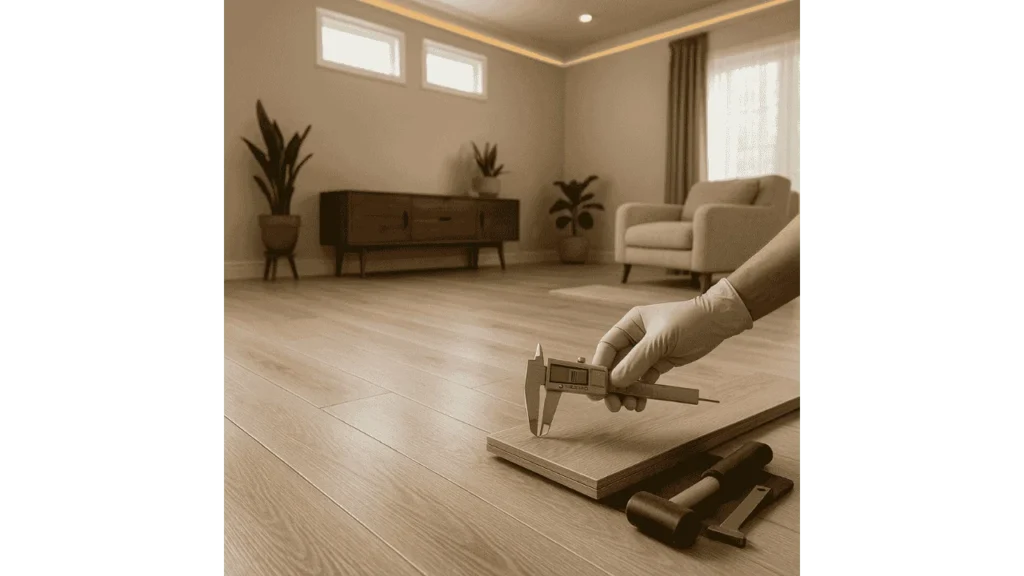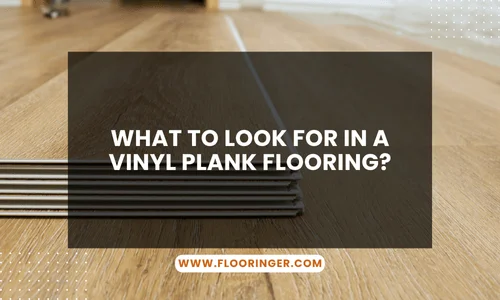Choosing the right vinyl plank flooring can significantly impact the look and functionality of your space. With a variety of options available, understanding what to consider before making a purchase ensures you get the best flooring for your needs. Factors such as durability, budget, and installation requirements all play a role in finding the perfect vinyl plank flooring.

What to Consider When Buying LVP Flooring?
Luxury vinyl plank (LVP) flooring offers a combination of style and durability, making it a popular choice for many homeowners. When selecting LVP flooring, consider factors such as the wear layer thickness, core construction, and surface finish. A thicker wear layer provides better protection against scratches and wear, making it suitable for high-traffic areas. Additionally, choosing between rigid core and flexible core options can impact the overall feel and stability of the flooring.
Wear Layer Thickness
The wear layer thickness determines how well the flooring will withstand daily wear and tear. Thicker wear layers provide greater protection against scratches, stains, and dents, making them ideal for busy households.
“The durability of your vinyl plank flooring depends heavily on the wear layer, it’s the invisible shield between everyday life and visible damage.” , Jenna Carlson, Certified Flooring Specialist at Surface Logic
A thicker wear layer ensures longevity and maintains the floor’s appearance for a longer period.
Read More: Which Direction to Lay Vinyl Plank Flooring?
Core Construction
The core of the vinyl plank flooring contributes to its overall strength and stability. Rigid core options, such as stone plastic composite and wood plastic composite, provide enhanced durability and water resistance. Flexible core options, on the other hand, offer a softer feel underfoot but may not provide the same level of stability.
“Choosing between SPC and WPC comes down to where and how you live, SPC is for stability under pressure, WPC is for comfort underfoot.” , Louis Harrington, Technical Consultant, ResiFloor Group
Surface Finish
Different surface finishes, such as embossed textures or matte coatings, can influence the overall aesthetic and feel of the flooring. Choosing a surface finish that complements your interior design style ensures a cohesive and visually appealing space.
Determining Your Budget: How Your Options Change with Money
Budget is a crucial factor when selecting vinyl plank flooring. Lower-cost options may offer basic features such as water resistance and simple designs, while higher-end options provide enhanced durability, better underfoot comfort, and a wider variety of styles. Investing in high-quality flooring upfront can save money in the long run by reducing the need for repairs and replacements.
Learn More: How to Acclimate Vinyl Plank Flooring?
Affordable Options
Budget-friendly vinyl plank flooring offers practical benefits without breaking the bank. These options provide simple designs and essential features suitable for areas with lower foot traffic.
Mid-Range Choices
Mid-range vinyl planks balance cost and quality, offering improved durability, varied design choices, and enhanced comfort underfoot. They are a popular choice for residential spaces with moderate foot traffic.
Premium Vinyl Flooring
High-end vinyl planks come with advanced features such as superior waterproofing, enhanced wear layers, and realistic designs that closely mimic natural materials. These options are well-suited for high-traffic areas and provide long-term value.
Different Types of Vinyl Flooring:
Understanding the different types of vinyl plank flooring helps in selecting the best option for your space. Each type has unique features that cater to specific needs and preferences.
Peel and Stick Vinyl Planks
Peel and stick vinyl planks are an affordable and easy-to-install option for DIY enthusiasts. These planks come with a pre-applied adhesive backing, allowing for a hassle-free installation. They are ideal for temporary or low-traffic areas but may not offer the same durability as other types.
Rigid Core Vinyl Planks (SPC)
Stone plastic composite vinyl planks feature a dense core that provides exceptional durability and resistance to moisture. This type of vinyl flooring is suitable for high-traffic areas and areas prone to moisture, such as kitchens and bathrooms. SPC planks are known for their stability and ability to withstand temperature fluctuations.
Waterproof Vinyl Planks (WPC)
Wood plastic composite vinyl planks combine a waterproof core with added comfort underfoot. These planks offer a more cushioned feel and are great for residential spaces where comfort is a priority. WPC planks are highly resistant to water damage, making them an excellent choice for areas with high humidity levels.
Final Takeaways:
Selecting the right vinyl plank flooring involves considering various factors such as budget, flooring type, and thickness. Whether you prioritize affordability, durability, or aesthetic appeal, understanding your options can help you make an informed decision. By focusing on your specific needs and lifestyle, you can choose vinyl flooring that enhances your space and stands the test of time.
